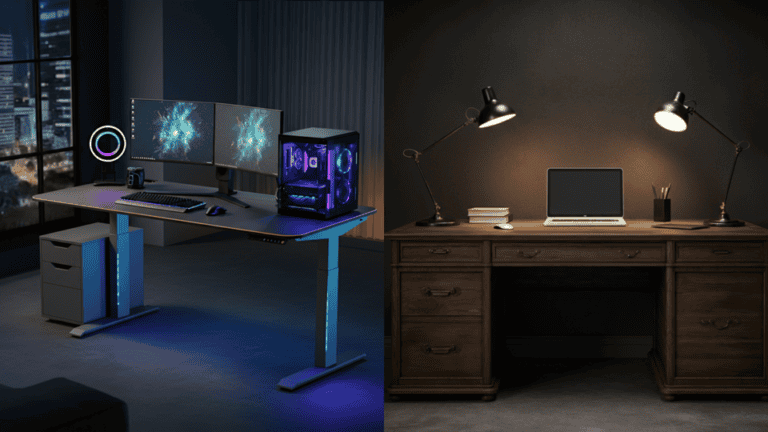Hey there, desk dwellers! If you’ve ever felt like your chair is secretly plotting against you after a long day of work, you’re not alone. Enter the smart standing desk – a potential ally in the battle against the sedentary office lifestyle. But is it really all it’s cracked up to be? Let’s dive in and find out!
Why Smart Standing Desks Are Gaining Traction
Smart standing desks are making waves in offices and home workspaces alike. These adjustable marvels promise to shake up our sitting routine and potentially boost our health. But before we get too excited, let’s look at what they really offer.
Physical Health Benefits: What’s the Real Deal?
The “Office Bod” Dilemma
While standing desks won’t magically melt away pounds, they do offer a modest increase in calorie burn compared to sitting. It’s not quite a workout, but hey, every little bit helps, right?
Heart Health: A Step in the Right Direction
Your heart appreciates movement, and standing desks encourage just that. By reducing prolonged sitting, you’re giving your cardiovascular system a bit of a break. It’s not a replacement for your gym session, but it’s a start!
Back Pain: A Potential Pain in the… Back?
Many users report relief from back pain when using standing desks. However, it’s not a one-size-fits-all solution. Proper posture is key, whether you’re sitting or standing. Your back will thank you for mixing it up.
Blood Sugar: A Surprising Twist
Here’s an interesting tidbit: standing after meals might help moderate blood sugar levels. It’s not a cure-all for diabetes, but it’s an intriguing finding that deserves more research.
Mental Health and Cognitive Benefits: Brain Boost or Bust?
Mood Elevator or Just Hot Air?
Some users swear by the energy boost they get from standing desks. While it’s not exactly a happy pill, the change in position and increased movement could contribute to better mood and reduced fatigue for some.
Productivity: Standing Ovation or Sitting Ovation?
The jury’s still out on whether standing desks significantly boost productivity. Some people find they’re more focused on their feet, while others prefer the comfort of their chair for deep work. The key? Finding your personal balance.
Smart Features: Not Just a Tall Table
Height Customization: One Size Doesn’t Fit All
These desks come with adjustable heights, which is great for ergonomics. Whether you’re built like a basketball player or a jockey, you can find your perfect height. No more Goldilocks syndrome!
Posture Pal or Nagging Neighbor?
Some smart desks come with reminders to change positions. It’s like having a tiny, furniture-shaped personal trainer – helpful for some, potentially annoying for others. Use these features wisely!
Long-term Health Implications: Crystal Ball Gazing
While we can’t predict the future, reducing sedentary time is generally considered a good thing for overall health. Standing desks might play a role in this, but they’re not a magic bullet. Think of them as one tool in your health toolkit, alongside exercise, a balanced diet, and good sleep habits.
Making the Transition: Baby Steps to Better Health
Excited to give it a try? Here are a few tips to help you ease into the standing desk life:
- Start slow: Rome wasn’t built in a day, and neither is standing desk stamina.
- Set it up right: Your desk should fit you, not the other way around.
- Get an anti-fatigue mat: Your feet will appreciate the cushioning.
If you’re in the market for a modern, budget-friendly smart desk that doesn’t compromise on features, you might want to check out the TTRacing Titus Smart Desk. I recently had the chance to review this impressive piece of furniture, and it’s definitely worth considering for anyone looking to upgrade their workspace. You can find my detailed review of the TTRacing Titus Smart Desk here, where I break down its features, pros, and cons.
Wrapping It Up
So there you have it, folks – the lowdown on smart standing desks. They’re not miracle workers, but they do offer an interesting option for those looking to shake up their work routine and potentially improve their health.Remember, the best posture is your next posture. So why not mix things up a bit? Your body might just thank you for it – or at least, it probably won’t complain as much. Happy standing (and sitting)!

